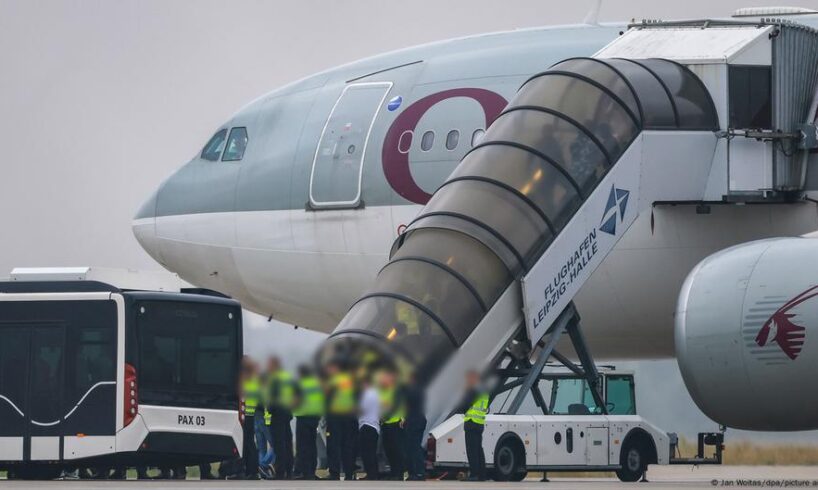
Germany said Monday that it has allowed two envoys from Afghanistan’s ruling Taliban regime to enter the country for the first time since the hardline, Islamist movement seized power in 2021.
The measure was approved to facilitate further deportations of Afghan migrants, after 81 Afghans with failed asylum claims and criminal convictions were deported on Friday.
That flight was the second of its kind since Germany resumed deportations to Afghanistan last year, which were halted after the Taliban returned to power and Germany closed its embassy in Kabul.
Afghanistan: Women become ‘invisible’ under Taliban
To view this video please enable JavaScript, and consider upgrading to a web browser that supports HTML5 video
Merz insists Taliban will not be formally recognized
The German government, like the rest of the international community except for Russia, does not formally recognize the Taliban government because of its human rights record and in particular its treatment of women.
But it does have “technical contacts” with the Taliban to deal with the deportations, which Qatar has facilitated.
German Chancellor Friedrich Merz has emphasized that despite the consular staff being allowed to enter and work in the country, there will be no diplomatic recognition of the Taliban Islamists.
Currently, the Afghan diplomatic representations in Germany are headed by officials who were accredited before the 2021 Taliban takeover, according to the German Foreign Office, which added that staff at the Afghan missions are stretched thin.
“The German government has an interest in ensuring that Afghan nationals in Germany receive adequate consular support — this includes, for example, the issuance of passports,” the Foreign Office said.
The Taliban envoys, who arrived in Germany over the weekend, will work at the Afghan embassy in Berlin and the Afghan consulate in Bonn, according to the German daily Frankfurter Allgemeine Zeitung (FAZ).
German deportations to Afghanistan spark rebuke
To view this video please enable JavaScript, and consider upgrading to a web browser that supports HTML5 video
Hot button issue amid rise of far-right
Germany stopped deportations to Afghanistan in 2021 when the Taliban retook control of the country. However, amid a rise of the far-right and anti-immigrant rhetoric, the government led by the conservative bloc of Chancellor Merz has put deportations high on the agenda.
The deportations had already resumed under Merz’s predecessor Olaf Scholz, who had pledged to ramp up removals of rejected asylum-seekers and migrants with criminal convictions in the wake of violent attacks involving migrants.
The deportations of Afghan migrants and asylum-seekers to Afghanistan has drawn sharp criticism from the United Nations.
Ravina Shamdasani, spokesperson for the UN Human Rights Office (OHCHR) said it was “not appropriate to return people to Afghanistan,” while speaking to reporters in Geneva.
“We have been documenting continuing human rights violations in Afghanistan,” she said.
Arafat Jamal, who works for the UN refugee agency (UNHCR) in Kabul, said a “non-return advisory” was still in place for Afghanistan, highlighting that “conditions on the ground are not yet ready for returns.”
“We urge countries not to forcibly return to Afghanistan,” he said.
German government spokesman Stefan Kornelius has said that further deportation flights are in the pipeline.
“The government has committed to systematic expulsions of those convicted of crimes and this will not be accomplished with just one flight,” he said.
Afghan refugee family faces migration reality in Germany
To view this video please enable JavaScript, and consider upgrading to a web browser that supports HTML5 video
For the latest news, explainers and analysis from Germany, follow our blog.
Edited by: Srinivas Mazumdaru





